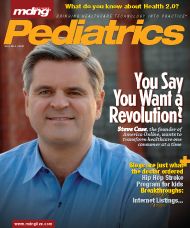Publication
Article
MDNG Pediatrics
Special Feature: A Pediatrician Talks About Blogging
I write because of something inside me burning to be said. I was in academic medicine, and I was able to express thoughts like these in the lunchroom with my colleagues.
Why
When friends and relatives heard that I was starting a blog, they were all stunned. “You have no time for all the things you do now!” they told me. “Where are you going to find time to blog? And why?” My answer has surprised a lot of people. I started blogging because sometimes I have something that I really want to say. That’s it. I don’t write looking for a thousand readers or with particular goals in mind. I’m not doing this to build a blog empire or market my practice. I don’t pay much attention to how many people read my blog—that’s not why I write. I write because of something inside me burning to be said. Earlier in my career, I was in academic medicine, and I was able to express thoughts like these in the lunchroom with my colleagues. We had many a fi erce debate over ethical or political issues, or how to make the system work better. Now, I’m so busy that I rarely get to indulge in discussions like that, even though I am blessed with a number of wonderful, smart colleagues with whom I could certainly debate such issues—if any of us had the time. I blog when I have something I really need to say, even if it means staying up 20 minutes later after fi nishing my charts at 1:00am.
What
I’m a primary care pediatrician part of the time, and I run infectious disease services for my very large, multi-specialty group practice. My blog focuses on pediatrics, infectious diseases, and other things about making the healthcare system better. What I have to say is generally directed at others in healthcare—mostly providers, but often administrators, nurses, and others. I write about clinical issues (eg, does MRSA vaginal colonization of a pregnant woman mean her newborn will be at higher risk of MRSA infection?), and ethical issues (eg, what justifi es mandatory vaccination for schoolchildren and what does that imply for which vaccines to mandate?). I sometimes share things that I have learned that are not medical but which I think others in medicine would also benefi t from learning (eg, an excellent book on managing people written by some non-business people, or some digital tools I’ve found useful). A few of my patients have stumbled across the blog and commented positively on it. I’m very careful not to talk about specifi c patients and their issues on the blog, even without identifying information. Also, an ADHD support group wrote and asked permission to publish one of my posts in their newsletter. I was certainly pleased that I had written something that was helpful to patients, though the post was intended for other pediatric clinicians. When I posted an item about a study adding more data to refute the purported relationship between vaccines and autism, I got some angry e-mails from parents of patients, including one physician-parent. Some of them were upsetting, with some personal epithets thrown around. The letter from the physician-parent was hardest of all. I was so saddened that his emotional response to what happened to his child seemed to have made him throw out all notion of evidencebased thinking. These responses are the price I pay for speaking in public, I guess—the old rotten tomato thrown in my direction.
When
At this point, I post a few times a month, at irregular intervals, when I fi nd something that I want to say. I do have a big folder full of recent papers from the literature that I’d like to write about, but I don’t often get the time to delve into it. More often, those useful, educational things get shoved aside by something that stirs me somehow. All in all, the blog is really satisfying the needs that drove me to start writing in the fi rst place. I’m glad I started.
Dr. Kruskal is the author of Dr. Ben’s Blogand a practicing pediatrician and pediatric infectious diseases specialist at Harvard Vanguard Medical Associates in Somerville, MA. He directs the Infection Control and Travel Medicine program at Harvard Vanguard.
